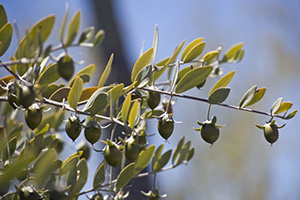As an Amazon Associate ShampooTree earns from qualifying purchases.
Restore Lifeless Hair with Jojoba Shampoo Ingredients
What is Jojoba?
Jojoba shampoo is made from the jojoba flower that grows from a shrub. It is grown mostly in Australia, Peru, Argentina, the Unites States, Israel and Mexico. The flowers on the tree become hardened and when it is sun-dried, it breaks open causing the seed to fall on the ground.
The seed looks like a coffee bean but it is much larger. Once it is collected, presses are used to extract the oil through squeezing and crushing. Tiny sediments called footes are taken out of the oil and the filtered oil is put into tanks and pasteurized in order to purify it.
Jojoba shampoo is a wonderful alternative to other harsher types of shampoos that are on the market. Other shampoos often contain sulfates and parabens which can strip hair and make it feel heavy due to coating over a period of time. This type of shampoo is a great option for keeping the hair moist and shiny.
Using jojoba as an ingredient in any shampoo is effective because the jojoba creates a barrier around the shaft of the hair, this offers a lot of protection as it prevents breakage and dryness. Jojoba is very similar to the lubricants that occur naturally in the human body, in fact, jojoba is the only compound in nature that closely resembles human sebum. This allows it to get through both the skin and scalp to penetrate deeply.
Jojoba Shampoo is great for unclogging the pores that are found in the hair follicle, this causes an increase in hair growth. If there is excess lubrication on the scalp then jojoba will help to regulate it. It will also balance the ph levels in the hair.
Benefits of Using Shampoos with Jojoba
Jojoba is not an oil although it is often referred to as such. Jojoba is actually a wax ester. Jojoba oil is put into shampoo by manufactures and those making the shampoo because it is believed to be a great way to trick the hair follicles to produce more sebum. This is good if the hair is dry and prone to breakage.
The tendency to balance sebum is why this type of shampoo can help scalp conditions such as dandruff, eczema, dandruff and psoriasis. This shampoo is also unlikely to cause an allergic reaction as it is non-comedogenic.
Summary of Jojoba Shampoo Benefits
- It mimics the sebum that occurs naturally in the scalp
- It is great for controlling dandruff
- It unclogs the pores in the hair follicle
- Regulates the ph levels in the hair
- Prevents Breakage
However, not all Jojoba shampoos are created equal and you should always read the label before purchasing. There are specific ingredients that you should look out for at all times. This is because many of these shampoos may not be organic enough and the amount of jojoba present may not be enough to offset any damaging effects.
There are certain ingredients that you should be wary of, sulfates have previously been mentioned but you should also make sure that there are low levels of alcohol in the shampoo. You should also be wary of silicones that have been mixed in with this type of shampoo. Sometimes it is best to create your own jojoba shampoo, here are a few simple instructions for doing so:
You will need an empty shampoo bottle, make sure that you cleanse this bottle thoroughly of any previous shampoos; as you don’t want any of the ingredients from the previous contents in your new shampoo. You will also need about eight ounces of distilled water and about three ounces of castile soap. Once you have assembled all the ingredients, then you should pour the distilled water into the bottle and add in three ounces of castile soap. You can then pour in about a quarter teaspoon of jojoba oil along with one or more essential oils of your choice. Good essential oils are tea tree and rosemary, if you use one oil, then add about thirty drops, if you use two then add fifteen drops of each.
Jojoba shampoo is really not that difficult to make and is well worth the effort if you are one of those people who are skeptical about buying natural products created by manufacturing companies.
Jojoba Seeds Photo by: Source




